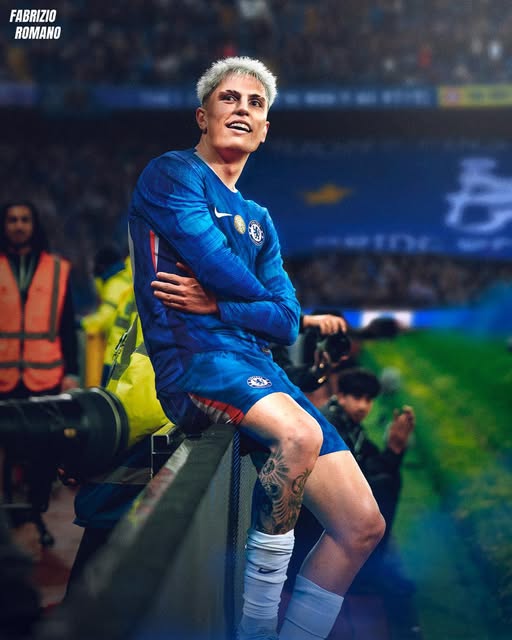
Alejandro Garnacho, one of Manchester United’s brightest young talents last season, has made headlines with his reported decision to leave the club. Even more stirring for fans was his recent appearance at Stamford Bridge, where he was seen watching Chelsea’s match against Fulham—further fueling speculation about his imminent transfer to the London club.
Unsurprisingly, this has caused a wave of reactions from Manchester United fans across social media and fan forums. For many supporters, Garnacho has been a symbol of United’s future—an academy graduate who embodied the potential resurgence of the club through youth. His electrifying performances on the wing, fearless approach, and growing maturity on the pitch made him a fan favorite. Now, the idea of him not just leaving United, but possibly joining a direct Premier League rival, has sparked frustration, sadness, and for some, even anger.
But the big question remains: Should Manchester United fans really be annoyed by this?
Understanding the Fan Reaction
From the emotional perspective of a fan, the frustration is understandable. Manchester United is a club with a rich history of loyalty and deep connections between its players and supporters. Legends like Ryan Giggs, Paul Scholes, and more recently Marcus Rashford have represented what it means to come through the academy and fight for the badge. When a young player like Garnacho, who seemed to be following that tradition, appears to turn his back on the club, fans feel personally let down.
The situation is made more sensitive by the destination. Chelsea isn’t just another club; it’s a direct competitor in the Premier League, often battling with United for European places and domestic trophies. Seeing Garnacho at Stamford Bridge, smiling in the stands while United fans are still coming to terms with the news of his departure, might feel like rubbing salt into the wound.
Additionally, the timing plays a role. If the transfer has not yet been officially completed, Garnacho’s presence at Chelsea’s game could be perceived as premature or even disrespectful. Some fans might interpret it as a lack of professionalism or loyalty.
A Professional Perspective
However, stepping back from the emotional lens, it’s important to consider the professional realities of modern football. Footballers, especially young ones, are often guided by agents, career planners, and advisors who are constantly evaluating what environment is best for development and success. Garnacho may view Chelsea as a club that aligns better with his ambitions—whether that’s more playing time, a different style of football, or a new challenge.
The truth is that football has changed significantly over the years. The concept of a one-club player is increasingly rare, especially among younger talents in a market-driven, global sport. Players moving between rival clubs has become normalized. From Robin van Persie’s switch from Arsenal to United, to Jadon Sancho returning to England with United after starting out at Manchester City, these moves are part of today’s football culture.
There’s also nothing inherently wrong with Garnacho attending a Chelsea game. If the transfer is already in the final stages, it’s natural for a player to start acclimating to the new club’s environment, even unofficially. It could be seen as a smart move to understand the club, its atmosphere, and even the expectations of its supporters.
What Should United Fans Focus On?
While fans are justified in feeling disappointed or even upset, directing that frustration entirely at Garnacho may be unfair. Unless he has made disrespectful statements or behaved unprofessionally in a clear and public way, he’s simply making a career decision—just as any player would.
Instead of dwelling on his departure, Manchester United fans might find it more productive to focus on the club’s broader direction. Are the right replacements being lined up? Is the club investing in the right mix of youth and experience? Is there a long-term vision in place?
Garnacho’s decision may sting now, but as history shows, no player is bigger than the club. For every departure, there is an opportunity for new stars to emerge.
In conclusion, while Garnacho’s decision to leave and his appearance at Chelsea’s game may understandably upset some fans, it’s important to view the situation with balance. He’s a young professional making a calculated move in a sport that’s as much a business as it is a passion. Emotions run high in football—but in the end, it’s the club’s identity and continued progress that matter most. United will move on, as they always have, and supporters will find new players to rally behind.





